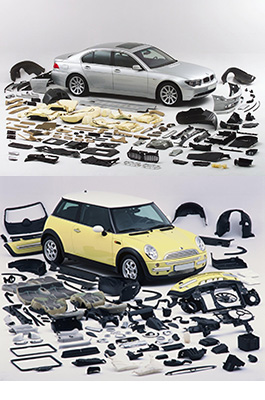SECOND HAND VEHICLE PARTS
Practical advice when buying ‘green parts’
Buying 2nd hand or ‘green’ parts can save huge amounts of money. But remember, these parts are 2nd hand, so it is unrealistic to expect them to be in ‘as new’ condition.

However, unless otherwise stated, when supplied their condition should correspond to their description.
As such, it is to be expected that parts sold as ‘tested’ should function correctly, whereas this will not necessarily be the case for those sold as ‘untested’. In many cases, ‘untested’ parts will be sold as ‘faulty’ or for ‘spares or repair’ (e.g. if removed from a traditional ‘Do-It-Yourself’ or Pick-a-Part yard) and will not be subject to a replacement or money-back guarantee (although a credit may be offered). However, all reputable vehicle dismantlers offer a guarantee on ‘off-the-shelf’ parts.
Vehicle dismantlers usually have no way of verifying the mileage of vehicles they receive – they will not normally have the service history or MOT certificate, so they will rely upon the mileage displayed on the odometer.
The most frequently encountered problems are:
- The customer has purchased the wrong part, often because they have asked for the wrong thing or not given enough information. The key information to provide is the make, model, registration number, fuel type (diesel/ petrol), gearbox type (manual/ automatic), and part number. When buying engines, give the engine code (not the engine number). The best way to avoid problems is to make sure you give the registration number of your vehicle to the dismantler. Many dismantlers now have access to number plate look-up and parts databases, so this will normally allow them to find the right part for your vehicle.
- The replacement part does not ‘cure’ the problem with the vehicle. For example an engine may need replacing but when a replacement engine is fitted, the same problem develops again. Good examples of this include where an engine overheats due to a problem with the cooling system, or looses oil due to a faulty turbo. Under these circumstances, it is not reasonable to expect the dismantler to supply another engine. For this reason, it is important that the customer finds out what caused the problem with their vehicle, and this is dealt with before the replacement part is used.
- The parts received are not as expected. For example, when buying an engine, in most cases the engine supplied will not include the starter motor, alternator, air-conditioning pump, power steering pump or turbo. Sometimes it will not include the inlet or exhaust manifolds or even the injectors. Do not assume that these will be supplied, so if you need them, you must ask.
Particular care should be taken when ordering & installing ‘used’ engines (for the reasons outlined above). So take note of the following points:
- Make sure you know the reason why the engine failed in the first place & that the causes are addressed when fitting the replacement engine
- Make sure you order the right engine for your car (correct engine code, fuel type, power output etc.)
- Most used engines will be supplied drained of oil – you must put new oil (of the correct type) in before you start it.
- Similarly, many engines will not contain an oil filter, & even if they do, many dismantlers specify that a new filter must be fitted
- Always fit a new timing/ cam belt when fitting a used engine. If this is not done & the belt fails, then you will invalidate any guarantee. Make sure the new belt is ‘timed-up’ correctly – this is a common problem
Finally, if something does go wrong with the part supplied, then it is important that you contact the supplier as promptly as possible, remain polite and take their advice. Within reason, most reputable dismantlers will try to help resolve the problem.